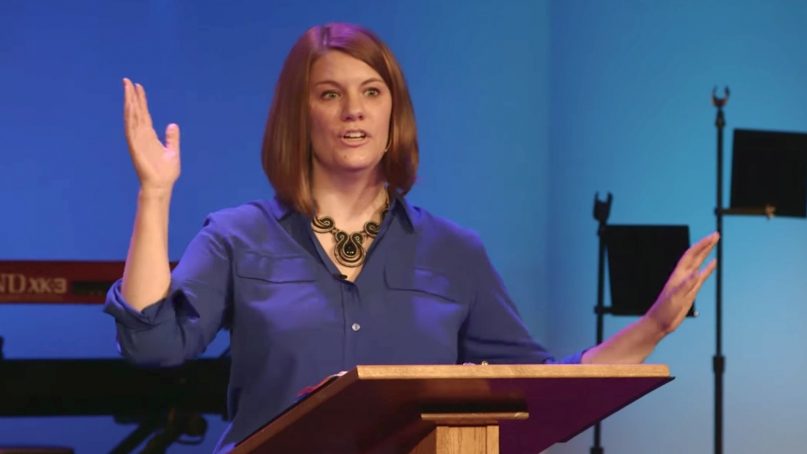(RNS) — This afternoon, with an aching heart, I went around the house to gather Rachel Held Evans’ books from various locations: “Inspired“ was here in my office, shelved in biblical studies. “A Year of Biblical Womanhood” was in the living room with the other memoirs. And “Searching for Sunday” was in the upstairs hallway amidst the Christian living books, with Rachel sandwiched in a theologically apt way between the Benedictine Esther de Waal and the evangelical Leighton Ford.
It occurred to me while conducting this sad errand that Rachel, who passed away this morning at the age of 37, had much more to say in each of these categories — but we’ll never have another book from her, another blog post, another zinger of a tweet. I’ll never get to see her at another conference, her approachability a revelation to the would-be writers who lined up for a dose of her wisdom and trademark humor.
The loss does not seem possible.
RELATED: Rachel Held Evans, Christian writer of honesty and humor, dies at age 37
A note fell out of my copy of “A Year of Biblical Womanhood,” which I was asked to endorse nearly a decade ago, and it broke my heart. “Thanks so much for giving my book a read!” she wrote. “I hope one of these days we get the chance to hang out in person. I think we’d have way too much fun!”
I had never met Rachel at that time, but the book charmed my socks off. Funny and smart, it chronicled Rachel’s adventures in attempting to live the Bible’s advice for women over the course of a year. She was vulnerable but not exhibitionist, and I found her snark delicious, as when she was taking down various church fathers’ attempts to treat the sexy biblical book Song of Songs as a religious allegory:
“According to Origen, the two breasts that the suitor is so eager to grasp represent the Old Testament and the New Testament. The lips he longs to kiss represent the Eucharist, noted another medieval scholar. The luxurious bed on which the lovers lie represents the convents of the Church, said Saint Bernard.
Sure. And Hooters represents the American affinity for owl culture.”
I did get to know Rachel a bit through conferences and meetings over the years and enjoyed her immensely. But it was through her books that I knew her best and came to understand more about myself and my own beliefs. Rachel once said that she felt a kinship with me because she knew that as a Mormon woman blogging in a patriarchal religious culture, I understood intuitively some of what she was up against as an evangelical woman writer who was pushing the boundaries of what was considered acceptable behavior for women. Yep.
But now Rachel won’t be pushing those boundaries anymore. She is gone, eating her 70-percent dark chocolate with raspberries somewhere in the celestial sphere. I like to think of her hanging out there with the recently deceased Eugene Peterson and Phyllis Tickle, talking theology and books and life.
RELATED: Remembering a woman of valor: 4 gifts Rachel Held Evans gave us
One thing Rachel shared with them was a love of the Psalms, which all three discovered in adulthood as they navigated questions of faith and joy. In “Searching for Sunday,” which chronicled Rachel’s movement from evangelicalism toward liturgical Christianity, there’s a scene in which she visits a Benedictine monastery and is taken by the silent safety of the place. Today I re-read that section in tears, because the Psalm she chose to focus on proved so prophetic. This is the Psalm that I will be reciting in the days to come as I remember Rachel, her goodness and her brilliant mind, and pray for her family and friends who are left behind.
“ … Psalms have a way of reminding the reader — or, in this case, the chanters — that whatever joy, agony, fear, delight, or frustration one is experiencing at the moment has, in fact, been experienced before. In this sense, a psalm can be both intimate and communal, deeply personal and profoundly universal.
At Vespers that night, in the company of twenty men who had taken vows of poverty, chastity, community, work, and prayer, and with whom I seemed to have so little in common, I intoned the words of Psalm 39:
Show me, Lord, my life’s end
and the number of my days;
let me know how fleeting my life is.
You have made my days a mere handbreadth;
the span of my years is as nothing before you.
Everyone is but a breath,
even those who seem secure . . . .
Hear my prayer, Lord,
listen to my cry for help;
do not be deaf to my weeping.
I dwell with you as a foreigner,
a stranger, as all my ancestors were.
Look away from me, that I may enjoy life again
before I depart and am no more.
And even in the Grand Silence that followed, I felt a little less alone.”






